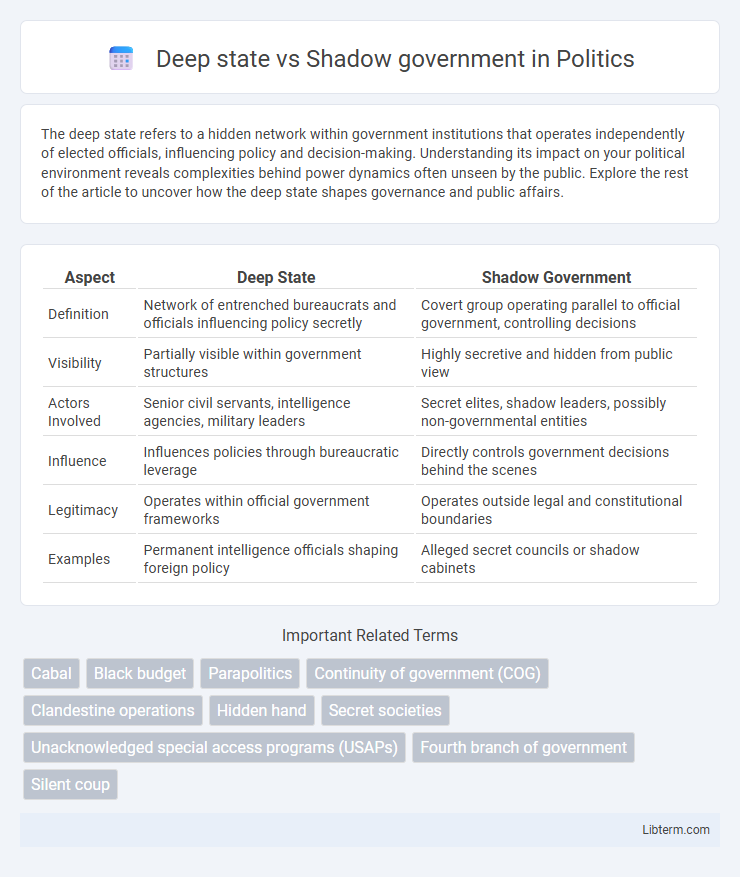The deep state refers to a hidden network within government institutions that operates independently of elected officials, influencing policy and decision-making. Understanding its impact on your political environment reveals complexities behind power dynamics often unseen by the public. Explore the rest of the article to uncover how the deep state shapes governance and public affairs.
Table of Comparison
| Aspect | Deep State | Shadow Government |
|---|---|---|
| Definition | Network of entrenched bureaucrats and officials influencing policy secretly | Covert group operating parallel to official government, controlling decisions |
| Visibility | Partially visible within government structures | Highly secretive and hidden from public view |
| Actors Involved | Senior civil servants, intelligence agencies, military leaders | Secret elites, shadow leaders, possibly non-governmental entities |
| Influence | Influences policies through bureaucratic leverage | Directly controls government decisions behind the scenes |
| Legitimacy | Operates within official government frameworks | Operates outside legal and constitutional boundaries |
| Examples | Permanent intelligence officials shaping foreign policy | Alleged secret councils or shadow cabinets |
Defining the Deep State and Shadow Government
The Deep State refers to a network of influential members within government agencies, military, and intelligence communities who operate independently of elected officials to shape policy behind the scenes. The Shadow Government, on the other hand, is an alleged covert group or parallel organization that exerts control over official government functions without public accountability. Both concepts involve clandestine power structures, but the Deep State emphasizes internal bureaucratic influence, while the Shadow Government suggests a more organized and secretive alternative governance.
Historical Origins of Covert Power Structures
The concept of deep state traces back to early 20th-century Turkey, where clandestine networks within the military and bureaucracy influenced national policy beyond elected officials' control. Shadow government theories emerged during the Cold War era, highlighting secretive groups allegedly manipulating political outcomes behind the scenes in the United States and Western democracies. Both concepts reflect historical concerns about covert power structures operating parallel to formal government institutions, shaping governance through hidden agendas and undisclosed operations.
Key Differences Between Deep State and Shadow Government
The deep state refers to a network of entrenched bureaucrats, intelligence agencies, and military officials who operate within the government to influence policy and maintain control, often without public accountability. In contrast, a shadow government typically denotes an organized, covert group that operates outside the official political system, aiming to manipulate or usurp power clandestinely. Key differences lie in the deep state's institutional embedding and continuity versus the shadow government's covert, extra-governmental nature and often conspiratorial objectives.
Influence on Political Decision-Making
The deep state and shadow government represent covert networks exerting significant influence over political decision-making, often bypassing formal democratic processes. These entities manipulate policy outcomes through unelected officials, intelligence agencies, and bureaucratic control, steering agendas to serve hidden interests rather than public mandates. Their interference undermines transparency and accountability, complicating the balance of power within established governmental frameworks.
Media Representation and Public Perception
Media representation of the deep state often portrays it as a covert network of bureaucrats wielding hidden power within government institutions, while the shadow government is depicted as an even more secretive entity controlling political outcomes from behind the scenes. Public perception is heavily influenced by sensationalist news outlets and conspiracy theory platforms, which blur distinctions between the two concepts and fuel mistrust in official institutions. Social media amplification accelerates the spread of misinformation, shaping a polarized narrative that complicates efforts to distinguish factual government operations from speculative claims.
Case Studies: Real-World Examples
The Deep State and Shadow Government concepts have been examined through case studies such as Turkey's military influence over civilian government, exposing a complex network operating beyond elected officials. In the United States, investigations reveal how unelected bureaucrats and intelligence agencies can impact policy decisions, highlighting a parallel structure. These real-world examples illustrate the persistent tension between official government authority and covert, entrenched power groups shaping national agendas.
The Role of Intelligence Agencies
Intelligence agencies play a pivotal role in the dynamics between the deep state and shadow government by covertly influencing political decisions, often operating beyond public oversight and legal frameworks. These agencies gather and manipulate information, shaping national security policies and internal power structures without accountability. Their clandestine operations contribute to the perceived autonomy and hidden control attributed to both deep state actors and shadow governments.
Theoretical Frameworks and Conspiracy Theories
Theoretical frameworks on the Deep State and Shadow Government explore hidden power networks operating behind official political structures, often characterized by bureaucratic control or covert influence over policy decisions. Conspiracy theories amplify these concepts by suggesting secret alliances among intelligence agencies, military officials, and corporate elites, purportedly manipulating governmental functions without public accountability. Academic discourse contrasts evidence-based analyses with speculative narratives that shape public perceptions of state secrecy and democratic erosion.
Implications for Democracy and Governance
The concepts of the Deep State and Shadow Government highlight covert networks within or alongside official government structures that operate beyond public accountability, posing significant risks to democratic transparency and accountability. These hidden power centers can undermine elected officials, distort policymaking, and erode public trust in democratic institutions by prioritizing vested interests over the citizenry's will. Understanding and addressing these entities is crucial for reinforcing democratic governance and ensuring that government actions remain subject to lawful oversight and public scrutiny.
Strategies for Transparency and Accountability
Strategies for transparency and accountability in addressing the deep state and shadow government emphasize strengthening independent oversight bodies, implementing robust whistleblower protections, and enhancing public access to government information through Freedom of Information Act (FOIA) reforms. Leveraging technology such as blockchain for secure and transparent record-keeping can reduce clandestine activities within bureaucratic institutions. Establishing bipartisan investigative committees further ensures impartial scrutiny and limits the influence of unaccountable power networks.
Deep state Infographic

 libterm.com
libterm.com